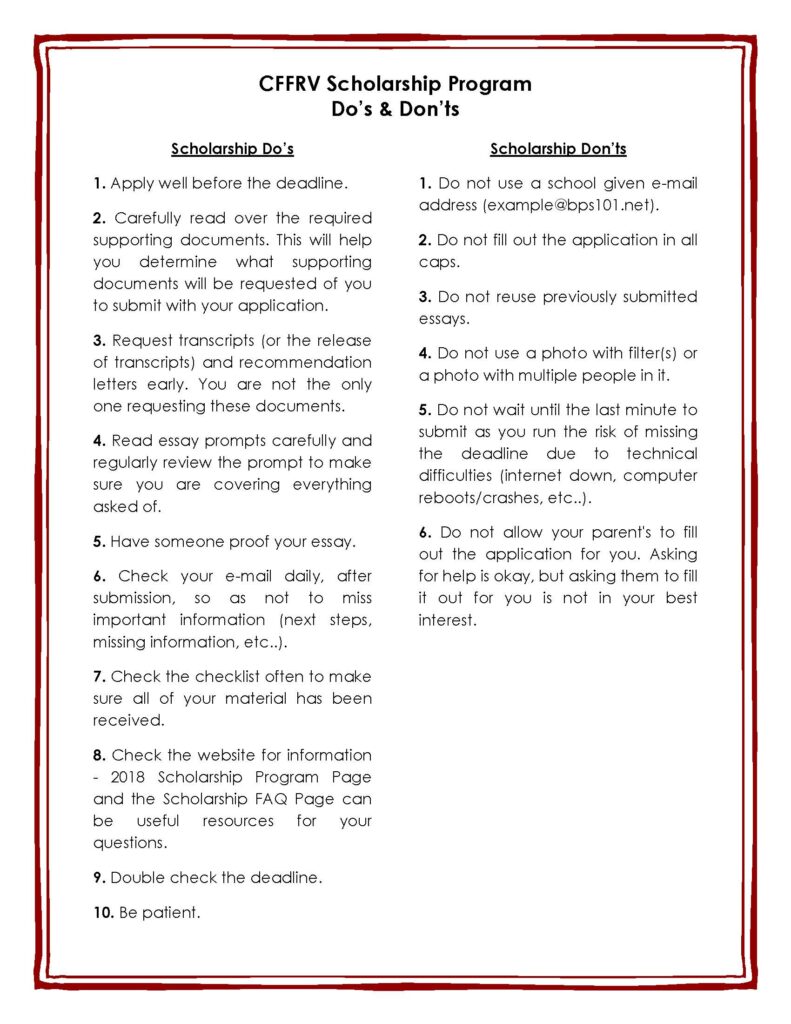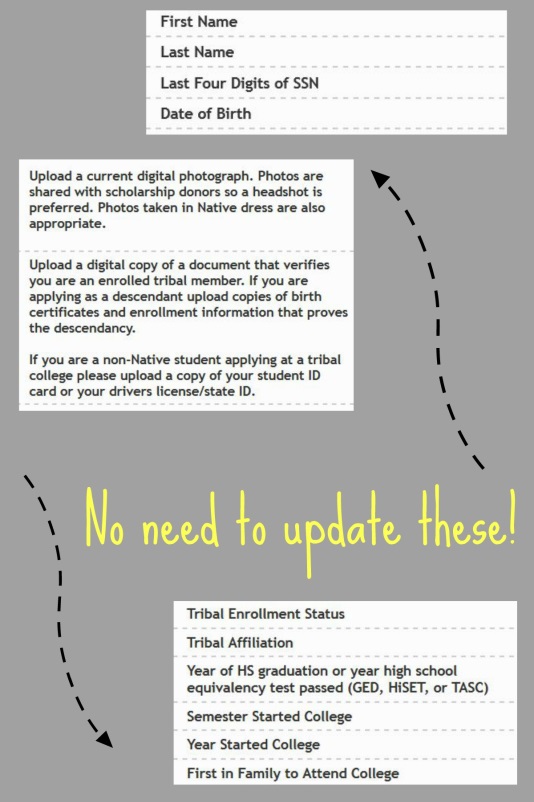Dos and Don’ts When Applying for Scholarships

Securing scholarships can significantly ease the financial burden of education. However, the application process can be competitive, requiring strategic planning and execution. Many students unknowingly make mistakes that jeopardize their chances of success. This article serves as a comprehensive guide, outlining the critical "Dos and Don'ts" when applying for scholarships. By understanding these guidelines, students can optimize their applications, highlight their strengths, and ultimately increase their likelihood of receiving the financial assistance they need to pursue their academic goals. From crafting compelling essays to avoiding common pitfalls, this roadmap will empower applicants to navigate the scholarship landscape effectively.
Do's and Don'ts When Applying for Scholarships
Applying for scholarships can be a competitive process, but understanding what to do and what not to do can significantly improve your chances of success. Being organized, truthful, and attentive to detail are crucial. Conversely, procrastination, generic applications, and neglecting instructions can lead to immediate rejection. Navigating the scholarship application landscape requires diligence and strategy.
Do: Thoroughly Research Scholarships
Before you even begin filling out applications, take the time to research scholarships that align with your academic profile, interests, and career goals. Don't just apply for every scholarship you find. Focus on those where you meet the eligibility criteria and have a genuine chance of winning. Use scholarship search engines, university websites, and professional organizations to identify suitable opportunities. This targeted approach will save you time and effort and increase your chances of success.
Don't: Miss Deadlines
One of the most common and avoidable mistakes is missing application deadlines. Scholarship providers have strict timelines, and late submissions are almost always automatically disqualified, regardless of the applicant's qualifications. Create a calendar or use a task management system to track all deadlines. Start working on your applications well in advance to avoid last-minute stress and ensure you have ample time to gather all required documents and write compelling essays. Procrastination can be a scholarship killer.
Do: Tailor Your Application
Avoid submitting generic applications that look like they could be sent to any scholarship provider. Each scholarship has its unique criteria and mission. Tailor your application materials to highlight how you meet those specific requirements. Research the organization offering the scholarship and demonstrate how your goals and values align with theirs. Customizing your essays and personal statements will show the selection committee that you are genuinely interested in their scholarship program.
Don't: Be Dishonest
Honesty is paramount in scholarship applications. Never exaggerate your accomplishments, falsify your grades, or plagiarize essays. Scholarship providers often verify the information you provide, and any discrepancies or acts of dishonesty will result in immediate disqualification and potentially damage your reputation. Always be truthful and transparent in representing your academic record, extracurricular activities, and financial need.
Do: Proofread Carefully
Typos, grammatical errors, and poorly written essays can significantly detract from your application. Before submitting, carefully proofread all application materials, including essays, personal statements, and recommendation letters. Ask a trusted friend, teacher, or counselor to review your application for errors and provide feedback on clarity and content. A polished and error-free application demonstrates your attention to detail and commitment to excellence.
| Dos | Don'ts | |
|---|---|---|
| Research | Thoroughly research scholarships that align with your profile. | Apply for any scholarship without checking eligibility. |
| Deadlines | Create a system to track deadlines. | Miss deadlines due to procrastination. |
| Application | Tailor applications to each specific scholarship. | Submit generic, one-size-fits-all applications. |
| Honesty | Always be honest and transparent. | Exaggerate accomplishments or falsify information. |
| Proofreading | Proofread carefully for errors. | Submit applications with typos and grammatical errors. |
What is the #1 way to increase your chances for a scholarship?

Target Scholarships Matching Your Strengths
- Research scholarships specifically tailored to your academic field, extracurricular activities, or demographic background. Don't apply for every scholarship under the sun. Instead, focus your efforts on those where you have a strong competitive advantage.
- Carefully review the eligibility requirements and application criteria. Make sure you meet all the minimum qualifications before investing time and effort in the application process.
- Identify scholarships with a smaller applicant pool. Smaller, local scholarships, or those aimed at niche groups often have less competition, increasing your odds of winning.
Craft a Compelling and Personalized Application
- Treat each scholarship application as a unique opportunity to showcase your strengths and achievements. Avoid generic essays and tailor your application materials to the specific scholarship requirements and values.
- Highlight your unique qualities, passions, and goals. What makes you stand out from other applicants? What are your aspirations, and how will the scholarship help you achieve them?
- Demonstrate a clear understanding of the scholarship provider's mission and values. Explain how your personal goals align with their organizational objectives.
Secure Strong Letters of Recommendation
- Request letters of recommendation from teachers, mentors, or advisors who know you well and can speak to your academic abilities, character, and potential. Provide them with ample time and information to write a strong and persuasive letter.
- Choose recommenders who can provide specific examples of your achievements and contributions. Vague or generic letters are less impactful and can weaken your application.
- Follow up with your recommenders to ensure they have submitted their letters on time. Late or missing letters can negatively impact your application.
Showcase Extracurricular Involvement and Leadership
- Participate in meaningful extracurricular activities that demonstrate your interests, skills, and commitment to your community. Choose activities that align with your passions and allow you to develop leadership qualities.
- Seek leadership roles within your extracurricular activities. Leading a club, organizing an event, or mentoring other students can demonstrate your initiative, responsibility, and ability to work with others.
- Quantify your accomplishments whenever possible. Instead of simply stating that you volunteered, describe the impact of your efforts (e.g., "Organized a food drive that collected over 500 items for the local food bank").
Meet Deadlines and Proofread Carefully
- Pay close attention to application deadlines and submit all required materials on time. Late applications are rarely considered.
- Thoroughly proofread your application for any errors in grammar, spelling, and punctuation. A polished and error-free application demonstrates your attention to detail and professionalism.
- Ask a trusted friend, teacher, or family member to review your application before submitting it. A fresh pair of eyes can catch errors or suggest improvements that you might have missed.
What not to say in a scholarship application?

Lack of Effort or Enthusiasm
Avoid demonstrating a lack of effort or enthusiasm in your application. This includes:
- Generic statements that could apply to anyone: Avoid vague responses like "I want to go to college to get a good job." Be specific about your goals and how the scholarship will help you achieve them.
- Poor grammar and spelling: Proofread your application carefully. Numerous errors suggest a lack of attention to detail and a lack of respect for the process. Consider using grammar and spell-check tools.
- Last-minute submissions: Starting the application early can help you put in more thought and effort.
Complaining or Negativity
Refrain from complaining or expressing negativity about your circumstances, teachers, or previous experiences. While it's okay to acknowledge challenges, focus on how you have overcome them and what you have learned.
- Blaming others for your failures: Taking responsibility for your actions is crucial. Avoid shifting blame onto others.
- Dwelling on hardships without highlighting resilience: While sharing hardships is appropriate in some cases, be sure to emphasize the positive lessons you learned and how you grew from the experience.
- Expressing bitterness or resentment: Maintain a positive and optimistic tone throughout your application.
Dishonesty or Exaggeration
Never lie or exaggerate your achievements, skills, or experiences. Scholarship committees often verify information, and dishonesty can lead to disqualification.
- Fabricating accomplishments: Don't claim to have achieved something you haven't.
- Inflating grades or test scores: Providing inaccurate academic information is a serious offense.
- Taking credit for someone else's work: Plagiarism or misrepresenting your role in a project is unacceptable.
Entitlement or Demanding Tone
Avoid presenting yourself as entitled to the scholarship or adopting a demanding tone. Show gratitude for the opportunity and express your appreciation for the committee's consideration.
- Assuming you deserve the scholarship: Acknowledge that many deserving candidates are applying and express your desire to earn the award.
- Making demands or ultimatums: Your application should be respectful and appreciative, not demanding.
- Implying the scholarship is your only option: While it's okay to emphasize the importance of the scholarship, avoid suggesting that your future hinges entirely on receiving it.
Irrelevant or Inappropriate Information
Keep your application focused and avoid including irrelevant or inappropriate information. This includes personal details that are not related to your qualifications or the scholarship criteria.
- Overly personal or private information: Avoid sharing sensitive details about your family, health, or relationships that are not relevant to the application.
- Controversial or offensive content: Refrain from expressing controversial political views, religious beliefs, or offensive opinions.
- Unprofessional language or humor: Maintain a professional and respectful tone throughout your application.
Frequently asked questions
What are some key 'DOs' when applying for scholarships?
Always tailor your application to each specific scholarship, highlighting the experiences and skills that align with their criteria. Proofread carefully to eliminate errors, and request letters of recommendation well in advance from individuals who know you well and can speak to your strengths. Showcase your passion and unique qualities to stand out from the competition.
What are some common 'DON'Ts' that could hurt my scholarship application?
Avoid submitting a generic application that doesn't address the scholarship's requirements. Don't plagiarize any part of your essay or application materials; originality is crucial. Don't miss deadlines, as late submissions are typically not considered. And finally, don't exaggerate your achievements or qualifications, as honesty and integrity are highly valued.
How important is the essay portion of a scholarship application?
The essay is often a critical component of a scholarship application, providing an opportunity to showcase your personality, writing skills, and passion for the field of study. It allows you to connect with the selection committee on a personal level, demonstrating your ability to think critically and communicate effectively, giving you a chance to stand out from other applicants with similar qualifications.
Should I apply for scholarships even if I think my chances are slim?
Yes, absolutely! You should apply for as many scholarships as you are eligible for, regardless of how slim your chances may seem. Each application increases your odds, and even smaller scholarships can significantly reduce your financial burden. Don't self-select out of the process; you might be surprised at the outcome. The more you apply, the better your chances.
